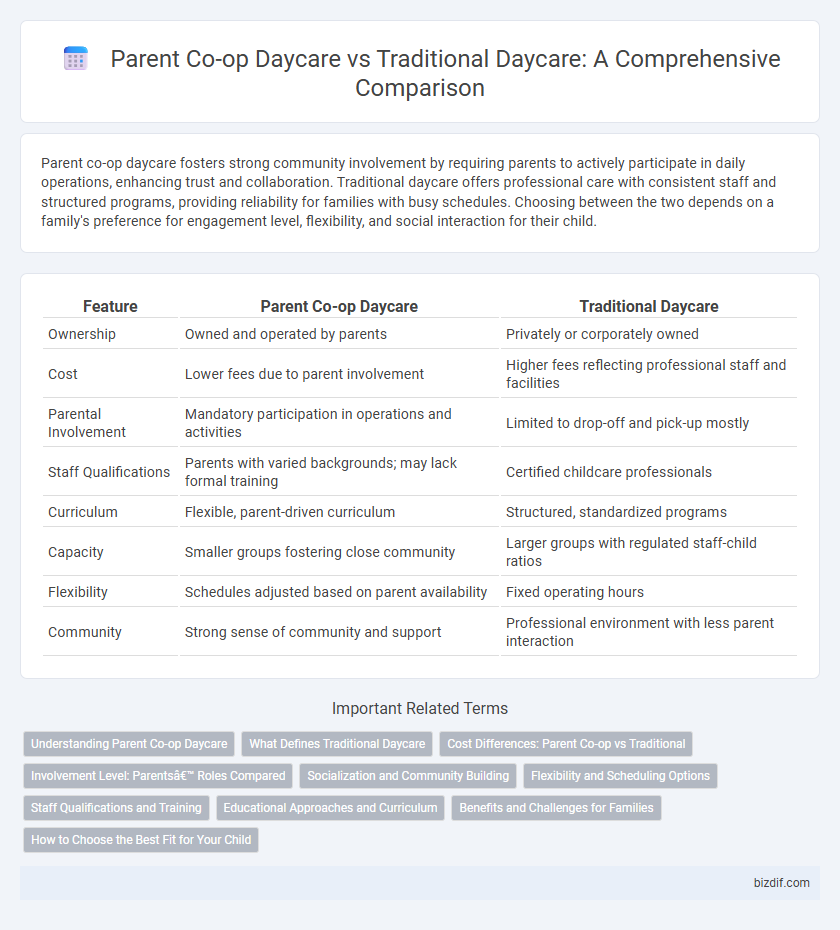Parent co-op daycare fosters strong community involvement by requiring parents to actively participate in daily operations, enhancing trust and collaboration. Traditional daycare offers professional care with consistent staff and structured programs, providing reliability for families with busy schedules. Choosing between the two depends on a family's preference for engagement level, flexibility, and social interaction for their child.
Table of Comparison
| Feature | Parent Co-op Daycare | Traditional Daycare |
|---|---|---|
| Ownership | Owned and operated by parents | Privately or corporately owned |
| Cost | Lower fees due to parent involvement | Higher fees reflecting professional staff and facilities |
| Parental Involvement | Mandatory participation in operations and activities | Limited to drop-off and pick-up mostly |
| Staff Qualifications | Parents with varied backgrounds; may lack formal training | Certified childcare professionals |
| Curriculum | Flexible, parent-driven curriculum | Structured, standardized programs |
| Capacity | Smaller groups fostering close community | Larger groups with regulated staff-child ratios |
| Flexibility | Schedules adjusted based on parent availability | Fixed operating hours |
| Community | Strong sense of community and support | Professional environment with less parent interaction |
Understanding Parent Co-op Daycare
Parent co-op daycare involves active parent participation in daily operations, creating a collaborative community-driven environment that enhances child development and fosters stronger relationships among families. Unlike traditional daycare, which is run solely by staff, parent co-ops require parents to share responsibilities such as caregiving, administrative tasks, and decision-making, promoting transparency and trust. This model often results in lower costs and a personalized approach to childcare tailored to the values and needs of participating families.
What Defines Traditional Daycare
Traditional daycare is defined by professionally trained staff providing structured care in licensed facilities, ensuring adherence to strict safety and educational standards. These centers often operate on fixed schedules and offer a curriculum designed to promote early childhood development across social, cognitive, and physical domains. Parents typically pay set fees, and the care environment separates caregivers from the child's family unit, emphasizing formal supervision and standardized routines.
Cost Differences: Parent Co-op vs Traditional
Parent co-op daycares typically offer lower costs compared to traditional daycares since parents contribute time and labor, reducing staffing expenses. Traditional daycares incur higher fees to cover professional staff salaries, facility maintenance, and regulatory compliance. Families seeking affordable childcare often find parent co-op daycares more budget-friendly due to shared responsibilities and reduced operational costs.
Involvement Level: Parents’ Roles Compared
Parent co-op daycares require high parental involvement, with parents participating in daily care duties, decision-making, and facility maintenance, fostering a strong community bond. Traditional daycares employ professional staff to manage all childcare responsibilities, allowing parents to have minimal direct involvement. This difference in parental roles significantly impacts the level of engagement, accountability, and cost structure between the two daycare models.
Socialization and Community Building
Parent Co-op daycares foster stronger socialization by involving parents directly in daily activities, creating a close-knit community where children and families build lasting relationships. Traditional daycares offer structured environments with professional staff, promoting social skills through guided peer interactions and expert supervision. Both models enhance children's social development, but parent co-ops emphasize community building and shared responsibility among families.
Flexibility and Scheduling Options
Parent co-op daycares offer greater scheduling flexibility by allowing parents to directly participate in managing hours and shifts, often accommodating unique family needs. Traditional daycares typically operate on fixed schedules with set drop-off and pick-up times, providing consistent but less adaptable care. Families seeking customizable options may prefer co-op models for their collaborative approach to balancing childcare and parental involvement.
Staff Qualifications and Training
Parent co-op daycares typically rely on parents to share caregiving responsibilities, often resulting in varied staff qualifications and less formal training compared to traditional daycares. Traditional daycare centers usually employ professionally trained staff with mandatory certifications in early childhood education and first aid, ensuring consistent expertise and safety standards. This formalized training in traditional settings supports structured developmental activities and reliable child supervision.
Educational Approaches and Curriculum
Parent Co-op daycares emphasize collaborative educational approaches where parents actively participate in curriculum planning, promoting a tailored and community-driven learning experience. Traditional daycares typically follow standardized curricula designed by early childhood education professionals, focusing on structured development milestones and consistent teaching methods. Both models prioritize cognitive, social, and emotional development, but co-op programs often integrate parent input to adapt activities more closely to the children's unique needs and family values.
Benefits and Challenges for Families
Parent co-op daycares foster strong community bonds by encouraging parents to actively participate in daily operations, reducing costs and enhancing trust in child care quality. Traditional daycares offer professional staff and structured programs, providing consistency and specialized expertise but at higher fees and less parental involvement. Families must weigh the cooperative's collaborative atmosphere and lower expense against the traditional model's convenience and professional accountability to determine the best fit for their needs.
How to Choose the Best Fit for Your Child
Choosing the best fit for your child involves evaluating the level of parent involvement, with Parent Co-op Daycares requiring active family participation while Traditional Daycares offer professional-led care. Consider your schedule flexibility, desired educational philosophy, and socialization needs to determine which environment fosters your child's growth and comfort. Assessing factors such as cost, caregiver qualifications, and child-to-teacher ratio ensures that the daycare aligns with your family's values and your child's developmental stage.
Parent Co-op Daycare vs Traditional Daycare Infographic

 bizdif.com
bizdif.com